Introduction:
The petroleum industry is a vital player in the global energy landscape, and its operations demand seamless coordination and efficiency. One key factor that significantly impacts productivity is the provision of suitable and convenient housing solutions for its workforce. In recent years, mobile housing has emerged as a game-changer, transforming how the petroleum industry operates and increasing overall efficiency. This article explores the benefits of mobile housing and how it enhances productivity and efficiency within the petroleum sector.
-
Flexibility and Mobility:
Mobile housing offers unparalleled flexibility and mobility for the petroleum industry. With the ability to deploy workforce housing directly to remote locations, companies can swiftly set up temporary living quarters close to drilling sites or refineries. This eliminates the need for lengthy commutes, ensuring that employees spend more time on critical tasks and less time traveling, thereby boosting efficiency.
-
Rapid Deployment:
In the dynamic petroleum industry, projects often require quick mobilization and demobilization of personnel. Traditional housing solutions can be time-consuming and costly to establish and dismantle. Mobile housing units, on the other hand, can be rapidly deployed and dismantled as needed. This agility allows petroleum companies to respond promptly to changing project demands, optimizing resource allocation and reducing downtime.
-
Enhanced Work-Life Balance:
Mobile housing provides a comfortable and conducive living environment for petroleum industry workers, promoting a healthier work-life balance. Satisfied employees are more productive and committed to their work, leading to improved job performance. By investing in employee well-being, petroleum companies can foster a positive work culture and attract top talent.
-
Cost Savings:
Opting for mobile housing solutions can lead to substantial cost savings for petroleum companies. Traditional housing setups often involve significant construction and infrastructure expenses. In contrast, mobile housing units are cost-effective, requiring minimal investment for setup and maintenance. Furthermore, the reduction in commuting costs for both employees and the company can further contribute to overall cost efficiency.
-
Safety and Security:
Safety is a top priority in the petroleum industry, and mobile housing plays a crucial role in enhancing security measures. Modern mobile housing units are designed with safety in mind, incorporating fire-resistant materials, emergency exits, and security systems. By providing secure and well-equipped accommodations, companies can minimize risks and ensure the well-being of their workforce.
-
Environmental Considerations:
Sustainable practices are increasingly crucial in all industries, including petroleum. Mobile housing solutions often leverage eco-friendly materials and energy-efficient designs, reducing their environmental impact. By adopting greener housing options, petroleum companies can align with environmentally conscious practices, improving their public image and contributing to a cleaner future.
Conclusion:
Mobile housing has proven to be a transformative solution in the petroleum industry, effectively increasing efficiency and streamlining operations. The flexibility, rapid deployment, cost savings, enhanced work-life balance, safety, and eco-friendliness offered by mobile housing units empower petroleum companies to meet the industry’s challenges head-on. By embracing these innovative housing solutions, the petroleum industry can forge ahead, driving growth, and meeting global energy demands while prioritizing the well-being of its workforce and the environment.



